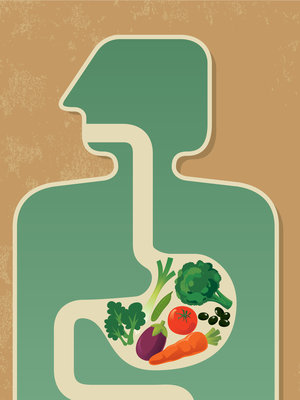Plus … 8 Superfoods to Feed Your Gut
Contributing Writer for Wake Up World
Antibacterial sanitizers, disinfectants and personal products line our supermarket shelves in testament to the idea that cleaner is better. But is it?
As we wage war against germs and bacteria, we’re also destroying the beneficial microbes within the body — leading to a rash of weight problems, an entire nation with perpetual brain fog and sky-rocketing rates of autoimmune disorders.
Were it not for all the emerging research on the microbiome (a.k.a. good bacteria in the gut) exposing the benefits of a robust internal microbe colony — we might as well throw in the towel and accept the fact that we are doomed to be fat, tired, sick and forever muddled.
Raphael Kellman, M.D. is one of the front runners in helping people shed excess weight, radically improve immunity and sweep away the cobwebs of poor brain function by rebuilding the microbiome. In fact, Dr. Kellman is so sure that a compromised gut is the basis for most ill health, he has written a book about it, The Microbiome Diet. It’s not so much a diet, but a way of coaxing the gut biome into a healthy state.
The method
The following is a general overview of Dr. Kellman’s protocol for rebuilding and maintaining the microbiome and gut health. The book provides more in-depth details, along with an extensive resource list and case studies.
Phase I
Follow for three weeks.
No dairy, grains, sugar, fruit (except berries), most legumes (except chickpeas and lentils), eggs, soy or alcohol.
Avoid processed/packaged food, corn syrup, trans fats, hydrogenated fats, dried or canned fruit, juices and gluten.
Butter/ghee is allowed.
Make sure to incorporate at least one option from the superfood list below with each meal.
Supplements:
- Cal-mag butyrate 200-300 mg/day
- Prebiotic’s: Inulin 4-6 grams/day, divided into two doses and arabinogalactans 500-1000 mg/2x per day.
- Glutamine 1-5 grams/day
- Slippery elm 200 mg/day
- Probiotic supplement (at least 50 billion active bacteria, the more the better)
- Digestive enzymes with hydrochloric acid or Swedish Bitters with each meal
Phase II
Follow for one month.
Foods to add back in: gluten-free grains, legumes and goat or sheep milk/cheese/cultured foods. Cow dairy kefir is acceptable. Mango, melons (except watermelon) and peaches.
In this phase, you only need to be in 90% compliance. However, the following foods are so damaging to the gut and microbiome, it’s best to avoid:
Processed/packaged food, corn syrup, trans fats, hydrogenated fats, dried or canned fruit, juices, gluten, all forms of soy, peanuts, canola or cottonseed oil.
Supplements to remove unhealthy bacteria, fungus, parasites and yeast from the intestines:
- Berberine
- Wormwood
- Caprylic acid
- Grapefruit seed extract
- Garlic
- Oregano oil
Phase III
Lifetime maintenance.
By the time you reach the third and final phase, your microbiome should be in good standing, along with your gut. Improvements in energy, weight and clarity will be apparent. Now it’s just a matter of maintaining the balance.
Most of the unhealthy bacteria should be gone by this point, so there’s no need to continue with the anti-fungal, anti-parasitic and antibacterial supplements found in phase II. However, a digestive enzyme with hydrochloric acid alongside each meal is still a good idea.
Continue with the prebiotic, probiotic and cal-mag butyrate. At this stage, you only need to be in compliance with the diet for 70% of the time, freeing you to eat pretty much whatever you want for the remaining 30 percent. Having said that, Dr. Kellman advises the complete avoidance of processed/packaged food, corn syrup, trans fats, hydrogenated fats, dried or canned fruit, juices, gluten, all forms of soy, canola or cottonseed oil. In addition, all forms of sugar (except Lakanto) should be limited to twice per week.
8 Superfoods to Feed Your Gut
Jerusalem artichoke.
According to Dr. Kellman, jerusalem artichokes are between 14-19% prebiotic inulin — which is great news for your microbiome. They also have the added benefit of filling you up with very few calories.
Turmeric.
As an exceptional anti-inflammatory, turmeric goes the extra mile in healing a leaky gut, encouraging a robust microbiome and promoting brain health.
Carrots.
Brimming with prebiotics, munching on a bit of carrot day will help feed the good bacteria in the gut, while discouraging harmful parasites.
Jicama.
A vegetable that mildly resembles an apple in flavor and texture, jicama is an excellent source of inulin and fiber.
Asparagus.
This tasty vegetable is a winner on many fronts. It “leaves you feeling full, helps you lose weight, and is rich in inulin, which feeds the microbiome,” Dr. Kellman says. As an added bonus, asparagus contains several nutrients that help to heal a damaged gut, as well as magnesium, which promotes a healthy level of digestive enzymes.
Garlic.
Not only a boon for immunity, garlic is also an outstanding prebiotic. It helps the microbiome flourish, while discouraging unfriendly gut bacteria.
Leeks.
High in fiber and flavonoids, leeks also have loads of manganese, which produces an abundance of digestive enzymes. They also are rich in vitamin A, another nutrient important for healing the gut.
Radishes.
Containing arabinogalactans (a compound that supports beneficial bacteria), radishes are a fantastically nourishing food for your gut.
Slippery elm, kiwi, pears and the bark of larch trees are excellent choices as well. If you need a bit of sweetness, Lakanto is your best bet.
Not surprisingly, a diet rich in fermented foods also keeps the beneficial gut microbes happy and thriving. Include unpasteurized sauerkraut, kimchi, miso and pickles that have been fermented in brine (not vinegar). Seek out kefir, yogurt and kombucha too. (Learn how to make your own Kombucha here.)
Moreover, Dr. Kellman strongly believes that GMOs, conventional meat, dairy and produce, along with sugar and processed food, are the main aggravators of a leaky gut and poor gut bacteria. Just say no to the temptation. Your health, waistline and microbiome will thank you.
Article Sources
- “The Microbiome Diet: The Scientifically Proven Way to Restore Your Gut Health and Achieve Permanent Weight Loss” Raphael Kellman, MD, Da Capo Press, 2014
- www.wellandgood.com/2014/08/05/8-surprising-good-for-your-gut-superfoods-you-should-be-eating
- www.wakeup-world.com/2015/04/03/being-too-clean-cancer-multiple-sclerosis-celiac-disease-autism
- www.prevention.com/food/food-remedies/superfoods-help-gut-bacteria-and-digestion
- www.huffingtonpost.com/dr-raphael-kellman/the-microbiome-diet-evolv_2_b_6436122.html
- www.wakeup-world.com/2015/03/28/power-packed-longevity-fruit-for-diabetics-health-enthusiasts-monk
Previous articles by Carolanne:
- Is Roundup Driving The Autism Epidemic? Leading MIT Researcher Says YES
- Over 100 Scientific Studies Agree: Cannabis Annihilates Cancer
- Emotional Energetic Healing: The Future of Medicine is Here
- Why Every Parent Should Consider Unschooling
- The Greenhouse of the Future: Grow Your Own Food Year-Round With This Revolutionary System
- First U.S. City Produces More Electricity Than It Uses — With 100% Renewable Technology
- Dry Skin Brushing Can Strengthen Immunity, Spark Detoxification and Reverse Aging
- Autistic Boy with Higher IQ Than Einstein Discovers Gift After Removal from State-Run Therapy
- Enhance Spiritual, Mental and Physical Well-being with a Pineal Gland Detox
- DIY $2 Self-Watering Garden Bed – Grow Produce Easily, Even in the Toughest Conditions
- How Being Too Clean Can Lead to Cancer, Multiple Sclerosis, Celiac Disease and More
About the author:
I’m Carolanne — a writer, chef, traveler and enthusiastic advocate for sustainability, organics and joyful living. It’s good to have you here. If you would like to learn more, connect with me at Thrive-Living.net or visit Twitter.com/Thrive_Living.

If you've ever found value in our articles, we'd greatly appreciate your support by purchasing Mindful Meditation Techniques for Kids - A Practical Guide for Adults to Empower Kids with the Gift of Inner Peace and Resilience for Life.
In the spirit of mindfulness, we encourage you to choose the paperback version. Delve into its pages away from screen glare and notifications, allowing yourself to fully immerse in the transformative practices within. The physical book enriches the learning process and serves as a tangible commitment to mindfulness, easily shared among family and friends.
Over the past few years, Wake Up World has faced significant online censorship, impacting our financial ability to stay online. Instead of soliciting donations, we're exploring win-win solutions with our readers to remain financially viable. Moving into book publishing, we hope to secure ongoing funds to continue our mission. With over 8,500 articles published in the past 13 years, we are committed to keeping our content free and accessible to everyone, without resorting to a paywall.








